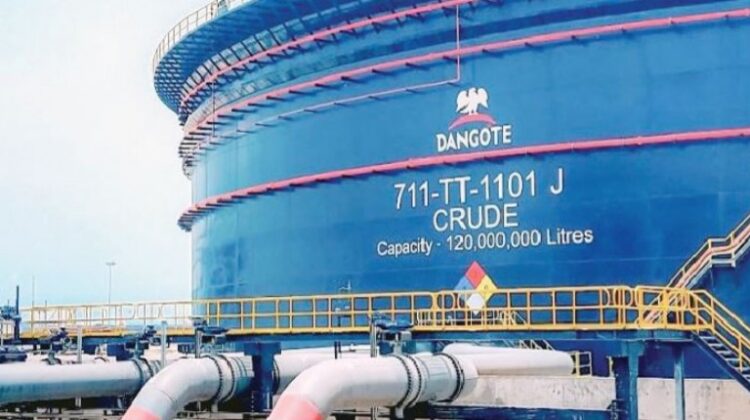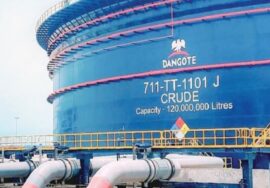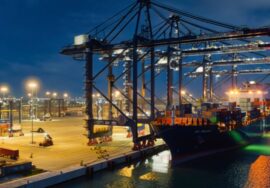
Native Ship Owners’ Task: DANGOTE Faces Captivity Test NIMASA Orders Product Evacuation by Sea Due to Dangote Refinery
Nigerian shipowners are concerned about a possible violation of the Cabotage Act in light of Dangote Group’s plans to transport its refined petroleum products by sea. They fear that the refinery’s operations could strengthen foreign dominance in the oil transport industry, placing local players at a disadvantage.
Remember that Dangote’s recently built jetty at the Lekki Free Zone would handle bulk cargo during the refinery’s development? Fatima Wali-Abdurrahman, Senior Adviser to the Group’s President on Special Projects and Strategic Relations, made this clear in a recent statement.
She claims that the company is dedicated to relieving the burden on road networks by shipping petroleum products to other ports in Nigeria.
Reactions from the maritime community, however, have exposed serious worries about how this strategy may affect regional shipping.
Shipowners who spoke with our correspondent have noted that Dangote’s plans appear to be limited to larger ships, thereby preventing smaller ships owned by Nigerians from taking advantage of the refinery’s cargo evacuation plans.
A shipowner who asked to remain anonymous said, “Dangote’s refinery wasn’t designed to handle smaller vessels. There is no room for the smaller ships that the majority of Nigerian shipowners operate because they are only considering vessels weighing 20,000 tonnes or more.
He clarified that the refinery is anticipated to produce a massive volume of refined petroleum products, and that many local ship owners will be left out of the transportation of these products due to this exclusion.
Additionally, the shipowner informed our correspondent, “I’ve heard that Dangote is thinking of purchasing a floater, which is a large modular ship that can remain offshore and load petroleum products. Then, this floater would supply smaller vessels, but it’s obvious that larger international ships would do the majority of the lifting.
“Despite the capacity and expertise available in Nigeria’s maritime sector, the concern is that such a setup would continue to prioritize foreign ships over local ones,” he bemoaned.
This has happened in the past with projects involving oil. International players typically receive the majority of contracts, leaving Nigerian shipowners out.
“Not that there aren’t any Nigerians who own large vessels; however, a significant number of them are independent marketers. As you may recall, there was a long-standing conflict between these independent marketers and Dangote. Companies like MATRIX, BOVAS, and PINNACLE all possess large vessels, but they refuse to utilize them due to internal disputes,” he remarked.
He continued, saying, “The enforcement of the Cabotage Act, which requires that vessels operating in Nigeria’s coastal and inland waters be owned and manned by Nigerians, is at the core of the shipowners’ concerns. Even though the law is clear, it has frequently not been enforced, which has allowed foreign companies to control the market.
“The purpose of the Cabotage Act was to safeguard Nigerian shipowners, but it is not being properly enforced. If Dangote’s refinery is allowed to give contracts to foreign ships, it will be a direct violation of this law.
“The Nigerian Maritime Administration and Safety Agency, or NIMASA, must take action and make sure that Nigerian ships are given preference when shipping these goods.”
The shipowners also questioned if Dangote Group intended to collaborate with Nigerian vessels. We’re not sure yet if Dangote will give Nigerian ships priority. The involvement of foreign companies in product transportation from the refinery has already been observed, so there’s no assurance that local operators will be given preference.
In response to these concerns, Aminu Umar, President of the Nigerian Chamber of Shipping (NCS), stated that Dangote’s announcement to transport its products by sea is a positive development for the shipping industry, but he also acknowledged the need for regulatory oversight.
“We applaud Dangote’s decision to transport 70% of their cargo by sea. It provides prospects for investors wishing to enter the industry as well as shipowners in Nigeria. NIMASA, however, is in charge of making sure that the Cabotage Act is followed and that Nigerian ships are given priority.
Although one or two Nigerian vessels are currently involved in the refinery’s cargo transportation, Umar stressed that the refinery’s increased output presents a substantial opportunity for local investors.
“This is a regulatory matter,” stated Doyin Olanipekun, a different shipowner. Enforcing the Cabotage Act and making sure that the domestic movement of petroleum products is limited to vessels flying the Nigerian flag are the responsibilities of NIMASA. Should they fail to do so, foreign supremacy in our waters will persist.
“It is evident that a void exists that must be addressed. There will be a need for ships to transport these products if the refinery processes such high volumes. However, Nigerian investors must be prepared to act, and the government must guarantee that the rules of the game are fair.
Along with highlighting the opportunity, the shipowner emphasized that Nigerians would only profit if the proper policies were implemented.
For Nigerian investors, this serves as a warning. In addition to the government’s support in enforcing the Cabotage Act and other local content laws, we must be ready to invest in the shipping industry.
They urged Dangote Group to make a public commitment to assisting local shipowners and to collaborate with NMASA to guarantee that Nigerian-flagged vessels are prioritized for delivering refinery goods. “It isn’t simply about the legislation. The shipowner highlighted that it is important to promote Nigerian enterprises and ensure that the revenue generated by this refinery stays in the country.









